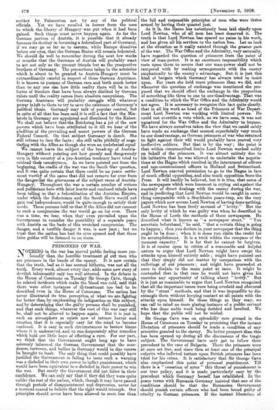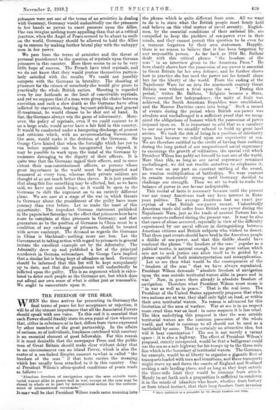PRISONERS OF WAR. N oTRINg in the war has moved public
feeling more pro- foundly than the horrible treatment 0 out men who are prisoners in the hands of the enemy. It is now certain that the truth, bad as it has seemed hitherto, was not all the truth. Every week, almost every day, adds some new story of devilish inhumanity only too well attested. In the debate in the House of Commons on Tuesday Sir George Cave, though he related incidents which make the blood rim cold, said t there were other instances of ill-treatment too bad to be described even in the House of Commons. The nation has never illustrated its true perception of what we are fighting for better than by emphasizing its indignation on this subject, and by determining that the guilty persona shall be puniehed, and that such things, whatever the cost of this war may still be, shall not be allowed to happen again. But it is just in such an atmosphere as exists now of intense horror and emotion that it is especially easy for the mind to become confused. It is easy in such circumstances to bestow blame where it is undeserved, and to run desperately after remedies whit hold out little hope of effecting a cure. For our part, we k that the Government ought long ago to have solemnly informed the German Government that the mur- derers, torturers, and bullies in Germany would in due course be }drought to book. The only thing that could possibly have justified the Government in failing to issue such a warning was a disbelief in their own power to inflict punishment, which would have been equivalent to a disbelief in their power to win the war. But surely the Government did not falter in their confidence. We can only say that if they did they were quite unlike the rest of the nation, which, though it may have passed through periods of disappointment and depression, never for a moment ceased to believe that the right would triumph. Our principles should never have been allowed to seem less than the full and responsible principles of men who were thrice armed by having their quarrel just.
As it is, the blame has notoriously been laid chiefly upon Lord Newton, who of all men has least deserved it. The truth is that Lorci. Newton has spared no pains in his work, and has given all his services to the nation free. Let us look at the situation as it really existed through the greater part of the war. The War Office and the Admiralty, very naturally, have regarded the question of prisoners from the point of view of man-power. It is an enormous responsibility which rests upon them to secure that our man-power shall not be tampered with by making arran ments with the enemy emphatically to the enemy's advantage. But it is just this kind of bargain which Germany has always tried to insist upon. For years she held more prisoners than we did, and whenever the question of exchange was mentioned she pro- posed that we should effect the exchange in the proportion of something like three to one to our disadvantage. That was a condition to which the War Office and the Admiralty would not agree. It is necessary to recognize this fact quite clearly, that in all his work as head of the Prisoners of War Depart- ment Lord Newton was working with limited powers. He could not override a veto which, as we have seen, it was not uenatural for the War Office and the Admiralty to impose. We have always ourselves taken the view that we could. safely have made an exchange that seemed superficially very much to our disadvantage, as German prisoners of war who returned to fight against their will would probably have proved very ineffective soldiers. But that is by the way ; the. point is that within circumscribed limits Lord Newton worked nobly on behalf of the prisoners. It was almost entirely due to his initiative that he was allowed to undertake the negotia- tions at the Hague which resulted in the internment of officers and nen-commissioned officers in Holland and Switzerland.. Lord Newton exacted permission to go to the Hague in face of much official opposition, and also much opposition fromthe Press. It will hardly be believed, but it is true, that some of the newspapers which were ioremost in crying out against the anomaly of direct dealings with the enemy during the war, and in predicting that Lord. Newton would be caught in some- thing comparable with a Stockholm peace-trap, are the very papers which now accuse Lord Newton of having done nothing. Lord. Newton has been freely accused of " levity." But the only levity of which he was guilty was when he described in the House of Lords the methods of those newspapers. He described what is known as " a newspaper stunt." " You ascertain beforehand," he said, " that a certain thing is going to happen ; then you declare in your newspaper-that the thing ought to be done ; when it is done you claim the credit for its accomplishment. It is a trick within the compass of the meanest capacity." It is for that he cannot be forgiven. It is of course open to critics of a reasonable and helpful nature to argue that Lord Newton might have swept the attacks upon himself entirely aside ; might have pointed out that they simply did not matter by comparison with the sufferings of our prisoners ; and might have proceeded at once in disdain to the main point at issue. It might be contended that in that case he would not havegiven his enemies any opportunity of talking about " levi4s"' But it is just as reasonable to argue that Lord Newton recognized that all the important issues were being overlaid and obscured by the " stunt ' methods, and that it was impossible to dis- entangle them without keeping contact at all points with the attacks upon himself. Be these thin:: as they may, we can call to mind no more glaring instance of a public servant who has done noble work being derided and insulted. We hope that the public will not be misled.
Sir George Cave was on splendidly sure ground in the House of Commons on Tuesday in promising that the instant liberation of prisoners should be made a condition of any armistice granted to the enemy. No better prospect than this has been opened up during all the discussions of the tragic subject. The Government have only got to follow their precedent in the case of Bulgaria. There the prisoners were at once set free, and since then at least one of the principal culprits who inflicted torture upon British prisoners has been tried for his crime. It is satisfactory that Sir George Cave also emphasized this point of personal punishment. Till there is a " cessation. of arms " this threat of punishment is our true policy, and it is made particularly- easy by the precedent which Germany herself has established. In the peace terms with Rumania Germany insisted that one of the conditions should be that the Rumanian Government should punish certain officers who had been found guilty of cruelty to German prisoners. If the instant liberation of prisoners were not one of the terms of an armistice in dealing with Germany, Germany would undoubtedly use the prisoners in her hands as pawns to exert pressure upon the Allies. One can imagine .nothing more appalling than that at a critical juncture, when the Angel of Peace seemed to be about to smile on the world, Germany should be allowed to hold the Allies up to ransom by making further brutal play with the unhappy men in her power.
We pass from the terms of armistice and the threat of personal punishment to the question of reprisals upon German prisoners in this country. Here there seems to us to be very little hope of success. The French have tried reprisals, and we do not know that they would profess themselves particu- larly satisfied with the results. We could not possibly compete with the Germans in brutality. The shooting of prisoners for the crimes of somebody else would give pause to practically the whole British nation. Shooting is regarded even by our hotheads as the limit of conceivable reprisals, and yet we suppose that if a man were given the choice between execution and such a slow death as the Germans have often inflicted by starvation, beating, bayonet-pricking, and general ill-treatment, he would choose to be shot out of hand. In fine, the Germans always win the game of inhumanity. More- over, the policy of reprisals, even if we could consent to it on a large scale, would never have a fair field in this country. It would be conducted under a hampering discharge of protest and criticism which, with an accommodating Government like ours, would make it the derision. of the Germans. Sir George Cave hinted that when the fortnight which has yet to run before reprisals can be inaugurated has elapsed, it may be possible to work upon the mind of the Germans by measures damaging to the dignity of their. officers. It is quite true that the Germans regard their officers, and to some extent their non-commissioned officers, as persons whose great importance in the world must be safeguarded and honoured at every turn, whereas their private soldiers are thought of as not much better than slaves. It is just possible that along this line something may be effected, but, as we have said, we have not much hope, as it would be open to the Germans to shift the argument on to an entirely different plane. We are now at a stage of the war in which threats to Germany about the punishment of the guilty have more potency than ever before. Let us make the most of this opportunity. The impudent German statement published in the papers last Saturday to the effect that prisoners here have more to complain of than prisoners in Germany, and that guarantees as to the position of Germans in China must be a condition of any exchange of prisoners, should be treated with severe contempt. The demand as regards the Germans in China is blackmail—nothing more nor less. Let the Government in taking action with regard to prisoners in general imitate the excellent example set by the Admiralty. The Admiralty drew up and published a list of the principal murderers in German submarines. Sir George Cave implied that a similar list is being kept of offenders on land. Germany should be informed that this list will be kept scrupulously up to date, and that due punishment will undoubtedly be inflicted upon the guilty. This is an argument which is calcu- lated to deter such people as the Germans are, but which does not offend our own sense of what is either just or reasonable. We ought to concentrate upon it.



































 Previous page
Previous page